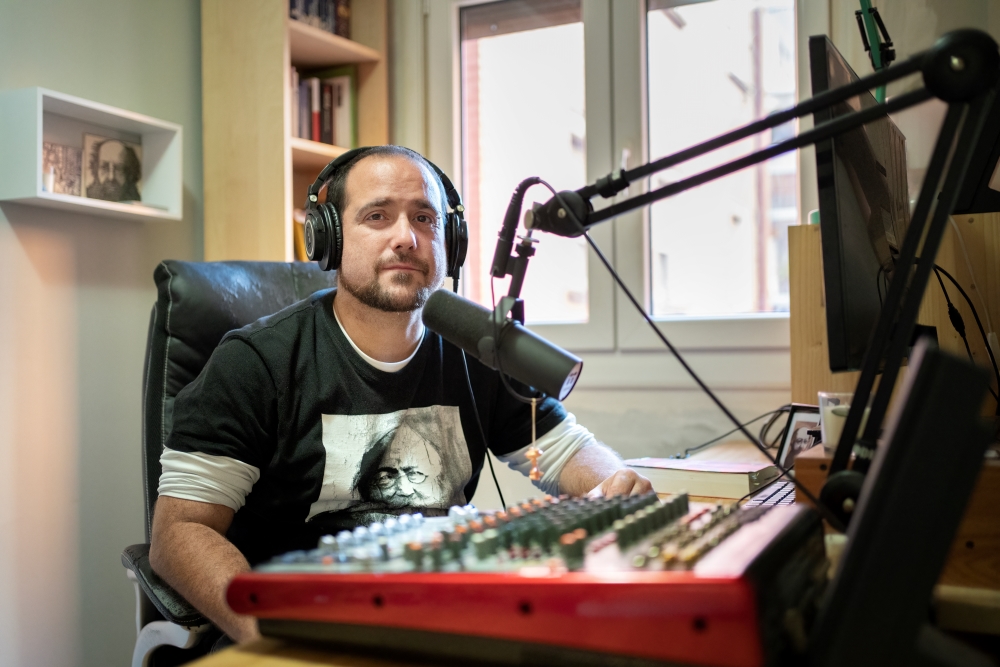
- The radio program Diogenes Flashlight is sounded by Arkaitz Prieto (Errekalde, 1981), known as Professor Arkadio. Its objective is to expose the history of expropriated classes, while at the same time analyzing the systems of domination, focusing on their way of life, culture, values and forms of organization. Due to academic rigor, it has a divulgative vocation, the experts take the capsules full of information. The pieces start with the humor of Monty Python films.

This year began the 15th season of Diogenes Lantern. Fifteen years, it says fast!
Yes, yes… fifteen years! The programme has evolved greatly. It is a reflection of a constancy, as the militancy is behind the session. In the early years I had almost no listeners, but now I have a responsibility, even a pressure, I will not deny it!
Let's start at the beginning. The program is named after Diogenes Sinopaco. Is it a declaration of intent?
It is entirely consistent. Diogenes was declared Plato's enemy. Plato was dealing with abstract ideas and diogenes of mundane ideas, to fill the belly, to a great extent challenging authority. But, above all, he was one of the initiators of the materialist trend of Western philosophy. He won Plato and abstract ideas have always been imposed. Diogenes takes us back to the earth.
It is known that the winners write History and that it often reproduces in part. Have you wanted to open a gap in this hegemonic story? The
vision of history that comes from below comes from a long English historiographical tradition, P.E. Especially since Thompson pushed social history. It has a Marxist view of how people have lived from the point of view of citizenship, breaking with military history. I'm stocked with experts who study him for interviews.
You've taken the academy out into the street.
My goal is not to be a product of using and throwing the sessions, but to be a simple manual. Have a hook and then go deeper into this issue, to continue researching. The session would not be possible without encouraging the people I have found in the academic world to participate.
Have you achieved the goal? You already have 47,000 followers in the podcast platform Ivoox.
I don't know what that number is, I don't think it matters. But I'm seeing more and more interaction. Over the years, alternative and collective editorials have contacted me to ask questions, to ask for references or to say that they have used one of my sessions to start discussions. That is a pleasure!

Libertarian history is not exempt from making women invisible… She has remembered biographies, strikes and fights of women like Emma Goldman or Louise Michel.
I'm increasingly trying to make the protagonists female characters, but they're not as many as they want. I, too, realize that I have to make changes in my view. The session has many gaps in the prominence and colonialism of women.
Now you record the programs at home, but you started broadcasting on the free radio Irola in Bilbao.
I come from the world of radio and I keep thinking I do radio, even though I record the program at home and then it's heard at ease.
Free radios have 40 years of history. At what point are they?
At first it was the discourse of free radios. “Come here and tell us what you mean.” Today anyone can stream from home, you only need a camera or a microphone. Therefore, we cannot continue with the same objective, we must change that discourse. I believe that we should be committed to street journalism.
Do you think they are taking that path?
I was recently at a free radio meeting. There I found the same message of forty years ago and the complacency and unmoving comfort of forty years ago. At the same time, there were people of great energy, wanting to radio and wanting to be useful for collectives and social movements. I firmly believe in the subversive ability of radio, I think we're still on time. The traditional media, which is becoming less and less legitimated, is the free media that can take a step forward. Free radios should serve for social movements and not the other way around.
After so many years, the Lantern of Diogenes is an important part of your life and that of your listeners. Is it a longitudinal project?
The answer is negative. I've been thinking about it for three years, and I still need strength and energy to definitely end the session. Although it gives me a vertigo, the time has come when I want to devote more time to other militancies. I believe in the blindly communicative aspect, but now I want to be on the street one hundred percent.
"I just occupied the Black Athenaeum Star, and I started diving into the Radio Irola, which was next to me. When I was growing up, I always heard free radios. I created Diogenes' Flashlight program to train myself through interviews with academic experts. I've been dealing with the history of workers: strikes, social mobilizations, rebellions, some biographies ... Not only that, but also the social struggles of today, there are also scientific trials...".